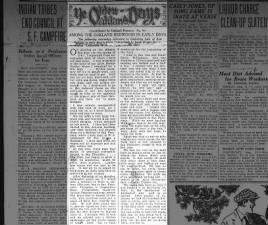Ye Olden Oakland Days AMONG THE OAKLAND REDWOODS IN EARLY DAYS - Oakland Tribune - 13 Aug 1922, Sun - Page 55
 Ye Olden Oakland Days
AMONG THE OAKLAND REDWOODS IN EARLY DAYS Sun, Aug 13, 1922 – Page 55 · Oakland Tribune (Oakland, California) · Newspapers.com
Ye Olden Oakland Days
AMONG THE OAKLAND REDWOODS IN EARLY DAYS Sun, Aug 13, 1922 – Page 55 · Oakland Tribune (Oakland, California) · Newspapers.comYe Olden Oakland Days
(Contributed by Oakland Pioneers. No. 91)
AMONG THE OAKLAND REDWOODS IN EARLY DAYS.
The following interesting reference to lumbering back of East Oakland in early days is taken from a book by Jacob Wright Harlan entitled "California '46 to '88", published in 1888:ON arriving at the Mission San Jose (in the spring of 1847), I separated from my comrades, most of whom I have not seen since. I was welcomed to the home of my uncle, George Harlan, where I remained for a few days..... It was necessary for me to get to work, and work was not easy to get. Gold had not yet been discovered, and but little was doing, wages being only eight and ten dollars per month. So, I determined to go to the redwood forest on the east side of the San Antonio range of hills, to the eastward of the present site of East Oakland, and there try to make shingles.
I was entirely unacquainted with this kind of work, yet I could but try, so I hired Richard Swift and went to work.
We cut down a very large redwood tree and worked it up into 15,000 shingles, which occupied us one month. I then had them hauled to San Antonio Landing, now East Oakland, and shipped them on a flatboat to San Francisco, where I sold them to W. A. Leidesdorf [Click that link. - MF] for five dollars a thousand. I then paid Swift his wages, and all expenses and had fifty dollars left.
At this time, there were four stores, or principal mercantile houses, in San Francisco..... The town had begun to grow a little; its population might be about three hundred. Lumber was scarce and not easy to be got. It had all to be sawed by whip-saws, as there were then no saw-mills in the country.
After disposing of my shingles, Leidesdorf asked me if I would take a contract to fence in sixteen fifty-vara lots in San Francisco belonging to Commodore Sloat, Commodore Stockton, Colonel Fremont and some others. The fence was to consist of two rails, with mortised posts and a space of three feet between the rails. He said their object was to prevent squatters from occupying the lots, and that he would pay me fifty dollars for fencing each lot. I thought well of this, and we entered into a written agreement on the above terms, in which there was no limit mentioned for the completion of the work.
I went to San Jose and found David Williamson, who was working at Oliver's grist-mill and earning two dollars and a half a day. I showed him my contract and told him what I had done, and asked him to be my partner in the work. At first he hesitated, saying that he was in good employment, earning certain wages, and that my job might be a failure. I said, "All right, David; we will see," and I mounted and rode off; but presently he called me back and said he would join me.
We then hired Swift and went to the redwoods, where we cut down trees and split them into posts and rails. I bought two yoke of oxen and a wagon, and hired my cousin, Joel Harlan, to help me haul the stuff to San Antonio for shipment to San Francisco. While we were hauling, Williamson was in the city, mortising the posts, and, as we soon got them all over to the city, I went there with the team to finish the work.
We then hired Swift and went to the redwoods, where we cut down trees and split them into posts and rails. I bought two yoke of oxen and a wagon, and hired my cousin, Joel Harlan, to help me haul the stuff to San Antonio for shipment to San Francisco. While we were hauling, Williamson was in the city, mortising the posts, and, as we soon got them all over to the city, I went there with the team to finish the work.
There was then no way to take wagons and teams across the bay from what is now Oakland to San Francisco, except by way of San Jose.
We had our tent on the sand hills on Market street on the lot where the Palace Hotel now stands. It was nearly all sand hills about there at that time, with scrub oak bushes all over the neighborhood. We had no tea or coffee, but yerba buena (a creeping vine) grew in plenty under the bushes. We made tea of it, and drank nothing else. I believe it is more wholesome than coffee or Chinese tea.....
We began this work on July 6 and finished it on September 20, 1847, to the satisfaction of Leidesdorf, who paid us as agreed. After paying all expenses, we had five hundred dollars to divide, and went to our camp, sat down on the blankets in the deep sand and made our division. David declared it was the best strike he had ever made, and that he was going back to Cincinnati. I tried to get him to stay, but he was set on going back, and did so.
 |
| Jacob Wright Harlan |
 |
| an ad from the same page of the Tribune as this article, see clipping above; interesting, is all |
Comments
Post a Comment